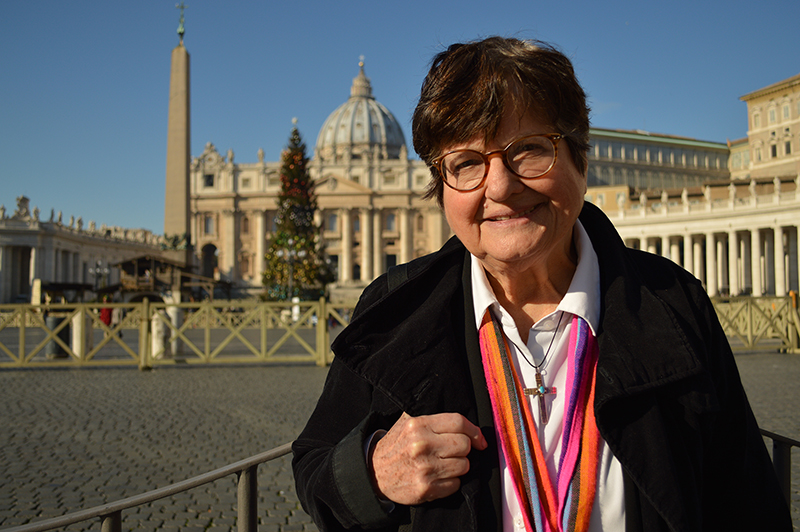
Two decades after her anti-death penalty work was transformed into an Oscar-winning movie, “Dead Man Walking,” Sister Helen Prejean’s campaign continues with the backing of Pope Francis. Religion News Service photo by Rosie Scammell
VATICAN CITY (RNS) Two decades after her anti-death penalty work was transformed into an Oscar-winning movie, “Dead Man Walking,” Sister Helen Prejean’s campaign continues with the backing of Pope Francis.
Prejean met with the pope on Thursday (Jan. 21) to deliver a thank-you letter from Richard Glossip, whose execution in the U.S. was halted in September after intervention from the pontiff.
But her celebratory meeting with the pontiff came just hours after another death row inmate, Richard Masterson, was put to death in Texas.
“I said, ‘They killed him.’ And he (Francis) lowered his eyes and said, ‘I pray, I pray.’ He really feels for people on death row,” Prejean recalled.
RELATED STORY: Protestants join Catholics in reconsidering the death penalty (COMMENTARY)
Masterson was convicted for killing Darin Honeycutt in 2001, although the defense team argued that the victim died of a heart attack during consensual sexual relations.
The pope had been following the case closely, Cardinal Christoph Schonborn said on Monday.
Francis voiced his opposition to capital punishment while addressing Congress in September. “Recently my brother bishops here in the United States renewed their call for the abolition of the death penalty,” he said. “Not only do I support them, but I also offer encouragement to all those who are convinced that a just and necessary punishment must never exclude the dimension of hope and the goal of rehabilitation,” Francis told lawmakers.
Prejean remains hopeful in the case of Glossip, convicted of hiring a man to kill a motel owner. His execution was indefinitely postponed after it was discovered that the wrong drug had been presented for the lethal injection.
The execution was stayed by Oklahoma Gov. Mary Fallin, who received a letter from the Vatican’s top U.S. diplomat, Archbishop Carlo Maria Vigano, urging her to save Glossip’s life on behalf of the pope.
“I sensed his innocence from the beginning. I’m with the seventh person on death row; three of the seven have been innocent — that’s how broken the thing (system) is.”
More than 150 people have been released from death row since 1973, following evidence of their innocence, according to the Death Penalty Information Center. Executions are disproportionately high in Southern states and people are more likely to be sentenced to death if their victim is white.
Campaigning equally for those who are guilty and innocent, Prejean argued that those on death row feel deep remorse and should not be executed for one act. Discussing a particular case, she said a man asked for forgiveness and admitted to being so high on drugs he had no memory of the crime.
The nun’s fight against capital punishment began in the 1980s, when she became a spiritual adviser to Patrick Sonnier, who was put to death in Louisiana. Prejean presented the pope with a Spanish copy of the book based on her experiences, “Dead Man Walking,” which was turned into a film for which Susan Sarandon won an Oscar for her role as Sister Helen.
Prejean said she felt compelled to act after witnessing Sonnier’s execution and realized the U.S. public could not see the reality of the death chamber.
“I came out and I vomited. I’d never watched a human being be killed, that I knew, and I remember thinking it was very clear: People are never going to get close to this.”
Before discussing capital punishment it is important to talk to people about the crime scene itself, she said.
“If you don’t go to that place and let them know you feel the outrage too, they’ll never be able to come over with you finally to the place where they can have compassion for the person (convicted).”
Prejean said Francis’ influence and support are never far away.
“The pope’s like a little lighthouse, and he keeps sending out that beam — this is what it’s about.”
(Rosie Scammell covers the Vatican for RNS)




